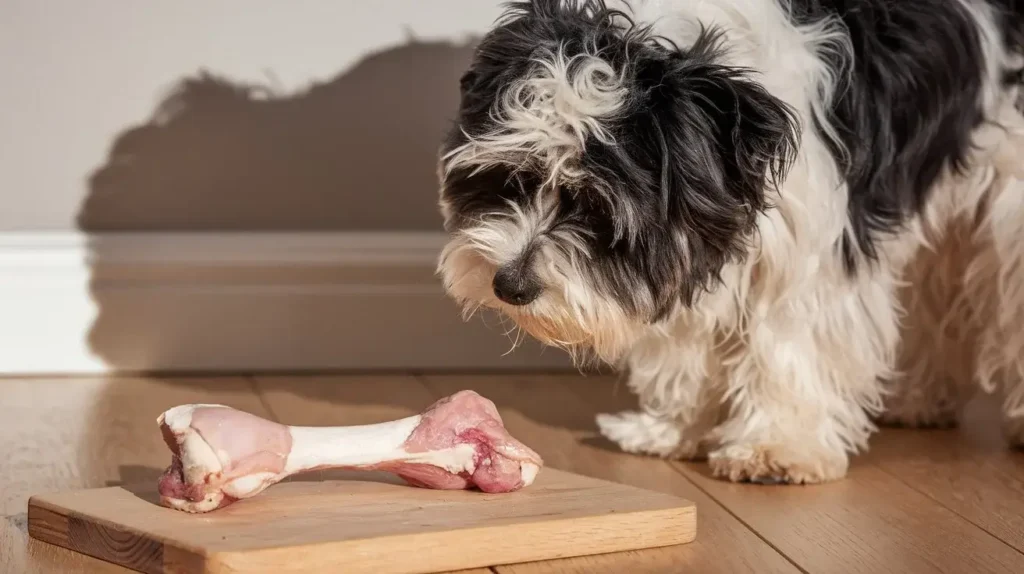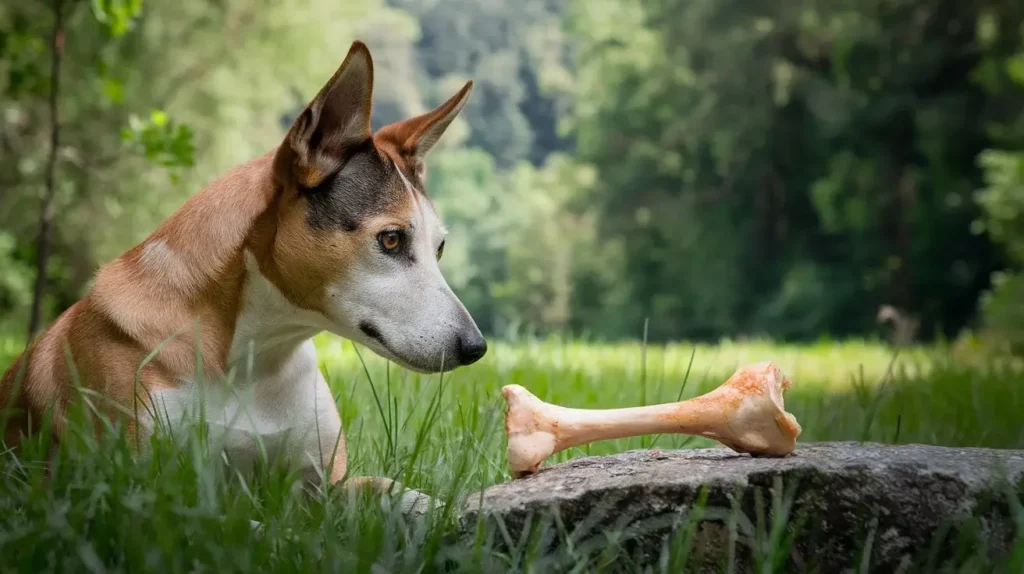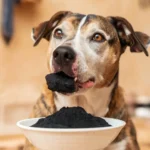As a responsible dog owner, you’ve likely pondered, “Can dogs eat raw chicken bones?” This question is not only common but also crucial for your pet’s health and safety. In this comprehensive guide, we’ll explore the potential risks and benefits of feeding raw chicken bones to dogs. Additionally, we’ll provide expert advice on safe alternatives and best practices for your canine companion’s diet.
The Raw Truth: Can Dogs Safely Consume Raw Chicken Bones?
To begin with, let’s address the central question: can dogs eat raw chicken bones? Surprisingly, the answer isn’t a simple yes or no. While dogs descend from wolves and naturally incline towards raw meat and bones, modern domesticated dogs’ diets require careful consideration.
Potential Benefits of Raw Chicken Bones for Canine Health
First and foremost, it’s essential to understand that raw chicken bones can offer some benefits to dogs. For instance:
- Dental Health: Chewing on raw bones can help clean your dog’s teeth naturally, thus reducing plaque and tartar buildup.
- Mental Stimulation: The act of gnawing on a bone provides mental stimulation and can, therefore, alleviate boredom.
- Nutritional Value: Raw bones contain essential nutrients like calcium and phosphorus, which are consequently vital for your dog’s overall health.
However, before you rush to feed your furry friend raw chicken bones, it’s crucial to consider the potential risks associated with this practice.
Risks Associated with Feeding Dogs Raw Chicken Bones
While some pet owners advocate for raw diets, including raw chicken bones, veterinarians and animal nutritionists often caution against this practice. Here’s why:
- Choking Hazard: Raw chicken bones can splinter and, as a result, cause choking or internal injuries.
- Bacterial Contamination: Raw chicken may contain harmful bacteria like Salmonella or E. coli, which can be dangerous for both dogs and humans.
- Digestive Issues: Consuming raw bones may lead to constipation or other gastrointestinal problems.
- Dental Damage: Hard bones can potentially crack or break your dog’s teeth.
Given these risks, many experts advise against feeding raw chicken bones to dogs. Nevertheless, if you’re still considering this option, it’s essential to understand how to minimize the risks.
Safe Practices: How to Feed Raw Chicken Bones to Dogs
If you decide to feed your dog raw chicken bones despite the risks, here are some safety guidelines to follow:
- Supervision: Always supervise your dog when they’re chewing on a bone.
- Size Matters: Choose bones that are appropriate for your dog’s size to reduce the risk of choking.
- Fresh is Best: Only offer fresh, raw bones and discard any leftovers after a few hours.
- Limit Consumption: Don’t make raw bones a daily part of your dog’s diet; instead, offer them as an occasional treat.
- Know Your Dog: Some dogs may handle raw bones better than others. Therefore, observe your pet’s reaction and adjust accordingly.
Can Dogs Eat Raw Chicken Thigh Bones? A Closer Look
Now, let’s address a specific question: can dogs eat raw chicken thigh bones? While chicken thigh bones are larger, they still carry risks.
Potential Risks of Raw Chicken Thigh Bones for Dogs
- Choking Hazard: Even larger bones can pose a choking risk, especially for smaller dogs.
- Bacterial Contamination: Raw chicken, regardless of the part, can harbor harmful bacteria.
- Digestive Issues: Large bones may cause constipation or blockages in some dogs.
Guidelines for Offering Raw Chicken Thigh Bones
If you decide to give your dog raw chicken thigh bones despite the risks:
- Always supervise your dog closely while they’re chewing the bone.
- Ensure the bone is fresh and from a reputable source.
- Remove the bone after 10-15 minutes to prevent over-consumption.
- Never give cooked chicken thigh bones, as these are more likely to splinter.
Safe Alternatives: What Can Dogs Eat Instead of Raw Chicken Bones?
Given the potential risks associated with raw chicken bones, many pet owners seek safer alternatives. Here are some options to consider:
1. Commercial Dental Chews for Canine Oral Health
Fortunately, most pet stores have dental chews that would be able to give pets many of the same benefits of raw bones without some of the risks. These are usually designed to clean teeth and freshen breath while providing some good mental stimulation.
2. Raw Vegetables as Healthy Bone Alternatives
Certain raw vegetables can be a safe and healthy alternative to bones. Carrots, for example, are crunchy and can help clean your dog’s teeth while providing additional nutrients.
3. Rubber Chew Toys for Safe Gnawing
Durable rubber chew toys can satisfy your dog’s urge to gnaw without the risks associated with raw bones. Many of these toys are designed to promote dental health as well.
4. Frozen Treats for Long-lasting Enjoyment
Consider freezing low-sodium chicken broth or pureed vegetables in a Kong toy. This provides a long-lasting, engaging treat that’s safe for your dog to enjoy.
The Importance of a Balanced Diet for Canine Health
While the question “Can dogs eat raw chicken bones?” is intriguing, a balanced diet is crucial for your dog’s overall health. Raw bones, whether you choose to offer them or not, should never be the mainstay of your pet’s nutrition.
Essential Components of a Healthy Dog Diet
A well-balanced dog diet typically includes:
- High-quality protein sources for muscle development and repair.
- Healthy fats for energy and coat health.
- Complex carbohydrates for sustained energy.
- Nutrients like vitamins and minerals are crucial for supporting overall health and boosting immune function.
- Adequate water intake for hydration and proper bodily functions.
Consult with your veterinarian to determine the best diet plan for your specific dog. Consider factors such as age, breed, size, and any health conditions when planning your dog’s diet.

Raw Diets for Dogs: Exploring the Controversy
The debate over whether dogs can eat raw chicken bones often stems from the broader discussion about raw diets for dogs. Let’s explore this topic in more detail.
What Constitutes a Raw Diet for Dogs?
A raw diet, also known as BARF (Biologically Appropriate Raw Food), typically consists of:
- Raw meat (including organ meat) for protein.
- Raw bones for calcium and dental health.
- Raw fruits and vegetables for vitamins and fiber.
- Eggs for additional protein and nutrients.
- Dairy products like yogurt for probiotics.
Proponents of raw diets argue that this approach more closely mimics what dogs would eat in the wild. They claim it can lead to benefits such as improved dental health, shinier coats, and increased energy levels.
Potential Benefits of Raw Diets for Canine Health
Some reported benefits of raw diets include:
- Improved digestion and nutrient absorption.
- Healthier skin and coat condition.
- Increased energy levels and vitality.
- Better weight management and muscle tone.
- Reduced allergy symptoms in some dogs.
Risks and Concerns Associated with Raw Dog Diets
However, raw diets, including those that incorporate raw chicken bones, come with several risks:
- Nutritional imbalances if not properly formulated.
- Risk of bacterial contamination from raw meat.
- Potential for choking or internal injuries from bones.
- Increased risk of tooth fractures from hard bones.
Given these concerns, many veterinarians and animal nutritionists advise against raw diets, especially those that include raw chicken bones.
Expert Opinions: Veterinarians Weigh In on Raw Chicken Bones
To further address the question “Can dogs eat raw chicken bones?”, let’s consider what veterinary professionals say on the matter.
The Consensus Among Veterinary Professionals
The majority of veterinarians advise against feeding raw chicken bones to dogs. Their concerns primarily revolve around:
- Safety: The risk of choking and internal injuries from splintered bones.
- Hygiene: The potential for bacterial contamination, which can affect both pets and their human families.
- Nutritional Balance: The challenge of providing a balanced diet when relying on raw foods.
Veterinarians’ Alternative Recommendations for Dog Diets
Instead of raw chicken bones, many veterinarians recommend:
- High-quality commercial dog foods that meet AAFCO standards for complete nutrition.
- Safe chew toys designed specifically for dental health and mental stimulation.
- Routine dental visits and expert cleanings are essential for maintaining peak oral health.
Individual Considerations: Every Dog is Unique
When pondering whether dogs can eat raw chicken bones, remember that every dog is unique. Factors to consider include:
- Size and Breed: Larger dogs may handle bones better than smaller breeds.
- Age: Puppies and senior dogs may be more vulnerable to dental damage or digestive issues.
- Health Status: Dogs with certain health conditions may be at higher risk for complications.
- Chewing Habits: Some dogs are more aggressive chewers and may be more likely to break teeth or swallow large pieces.
Transitioning to a New Diet: Prioritizing Canine Safety
If you’re considering introducing raw chicken bones or any new element to your dog’s diet, do so safely:
- Consult Your Vet: Always discuss significant dietary changes with your veterinarian first.
- Gradual Introduction: Introduce new foods slowly to avoid digestive upset.
- Monitor Closely: Watch for any signs of discomfort, allergic reactions, or digestive issues.
- Be Prepared to Adjust: If your dog doesn’t tolerate the new food well, be ready to discontinue it.
Conclusion: Making an Informed Decision About Dogs and Raw Chicken Bones
In a nutshell, dogs can eat raw chicken bones; however, most of the time, the risks outweigh the probable benefits. To the question, “Can dogs eat raw chicken bones?”, there is not really an across-the-board “yes” or “no”. Factors include individual characteristics of your dog and your ability to manage the associated risks.
As a responsible pet owner, your primary concern should be your dog’s health and safety. While some dogs may tolerate raw chicken bones without issue, many veterinarians and animal nutritionists advise against this practice due to the potential for serious complications.
Instead, consider safer alternatives that can provide similar benefits:
- High-quality commercial dog foods for balanced nutrition.
- Veterinarian-approved dental chews for oral health.
- Safe, durable chew toys for mental stimulation.
- Regular dental check-ups and cleanings for overall health.
A good diet, along with their individual needs taken into consideration, will play a very important role in your dog’s overall physical and psychological health. Always consult your veterinarian before making major changes to your dog’s diet, and stay current on new research and recommendations in canine nutrition.
Ultimately, it is upon you whether your dog keeps staying healthy and happy. Informed decisions and a concern for safety will go a long way in ensuring that your furry friend has a long, healthy, and happy life by your side. Whether or not you include raw chicken bones in your dog’s diet, or you substitute it with something safer for your buddy, the main thing in view will be good health and well-being for your pet.
Adjust your dog’s diet carefully. For instance, if you’re wondering can dogs eat raw chicken, it’s essential to understand the potential risks and benefits before making a decision.








